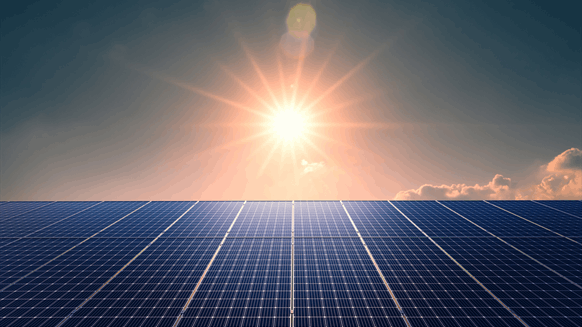TotalEnergies SE and QatarEnergy have signed an agreement to form a 50-50 joint venture to build a photovoltaic farm with a peak production of 1.25 gigawatts (GW) in Iraq’s Basra region.
The planned project is part of the $27 billion Gas Growth Integrated Project (GGIP) of the two companies and Basra Oil Co. (BOC). Launched 2023, the GGIP involves the capture of flared gas from oil fields to be used for power generation, the redevelopment of the Ratawi field and the construction of a solar farm and a seawater treatment plant.
The solar project is planned to have two million bifacial solar panels mounted on single-axis trackers. It would be executed in phases with startups between 2025 and 2027. The output can power about 350,000 homes in the Basra region, QatarEnergies said in a statement on its website.
QatarEnergy holds a 25 percent stake in the GGIP. TotalEnergies owns 45 percent and BOC has the remaining 30 percent.
TotalEnergies initially planned a one-GW solar farm, according to a company announcement April 5, 2023. The French company also said at the time it would invite Saudi Arabia’s ACWA Power for the solar project as agreed with Iraqi authorities.
The initial terms of the GGIP were signed September 2021 and the final terms took effect August 2023, according to TotalEnergies.
“This major multi-energy project combines the redevelopment of the Ratawi field, the recovery of gas now flared on three oil fields, including Ratawi, in order to power power plants, a 1 GW solar farm and the construction of a seawater treatment plant for injection and to maintain the pressure of the region’s oil fields”, TotalEnergies said in its 2023 annual report. It took over Ratawi’s operatorship November 2023.
The United States government welcomed the deal, which it said “will accelerate Iraq’s path to energy self-sufficiency and advance Iraq’s collective climate change objectives”.
The GGIP will help Iraq “end its dependence on unreliable energy sources and strengthen essential services for the Iraqi people”, the State Department said in a statement July 11, 2023.
“Concluding this deal also signals a fast-improving business climate that will help attract the foreign investments needed to generate economic opportunity for all Iraqis”.
However, according to an analysis on The Washington Institute for Near East Policy, while the GGIP is expected to help meet bridge demand in a country reliant on Iran for its power needs, the grid infrastructure upgrade needed to carry the new load faces financial and regulatory hurdles.
“Indeed, Iraq’s power sector has suffered heavy damage over the past few decades due to war and other factors”, said the analysis published July 17, 2023. “The supply-demand gap keeps widening as technical and commercial losses persist, exacerbated by financial challenges and high-level corruption”.
In the meantime, Iraq has secured another waiver from the U.S. to continue importing power from Iran without running afoul of Washington’s sanctions against Tehran.
The four-month waiver issued July 2024 by the State Department for the 22nd time “is about the department permitting Iraq to purchase Iranian electricity while Iraq continues to develop its domestic generation capacity and continuing to create its own independence off of Iranian energy”, department Principal Deputy Spokesperson Verdant Patel told a press briefing July 18, 2024.
“Currently our estimates are that it relies on Iran for about 25 percent of its energy”, Patel added. “Just a few years ago, that number was 40 percent. And in recent years we have seen our partners in Iraq double its capacity for its own electrical generation”.
To contact the author, email jov.onsat@rigzone.com
WHAT DO YOU THINK?
Generated by readers, the comments included herein do not reflect the views and opinions of Rigzone. All comments are subject to editorial review. Off-topic, inappropriate or insulting comments will be removed.
